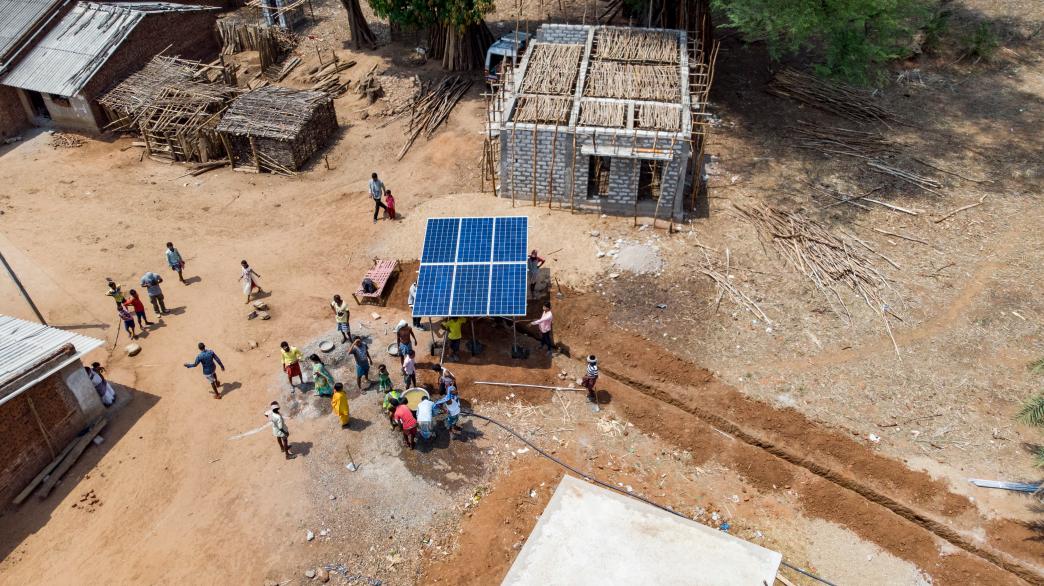
Equity and Good Governance Are Essential for the Energy Transition
As governments around the world scramble to boost oil and gas production and/or secure alternative supplies after Russia’s invasion of Ukraine, the resulting energy crisis feels like more than just a bump in the road for the global energy transition. Still more confusing is what our colleagues aptly describe as the “minefield of potentially mixed and misread messages” about the energy transition intentions of wealthier nations, few of which are close to achieving compliance with the Paris climate goals. The EU has proposed to label gas-fired power generation as “green” but then Germany doubled down on ambitious 100 percent renewable energy power plans, calling renewables “the energy of freedom.” The Biden administration stressed the need to reduce dependence “on oil in general” and then called on U.S. oil and gas producers to ramp up supply as quickly as possible, scarcely a week later.
In this confusing atmosphere the Tyndall report, “Phaseout Pathways for Fossil Fuel Production Within Paris-compliant Carbon Budgets,” is a welcome and essential map. Its most significant contribution is to apportion responsibility for winding down production based on equity considerations — an approach we at the Natural Resource Governance Institute (NRGI) strongly support. Wealthier countries should cut fossil fuel production first and fastest because they depend less on oil and gas revenues and have greater capacity to finance the energy transition. The report divides producers into five groups, the wealthiest of which would need to entirely phase out production by 2031 (a 98 percent drop from today’s levels!), for a better than even chance of avoiding warming above 1.5°C. Critically, and even more relevant to delivering a just transition, the report also concludes that “[a]n equitable transition will require wealthy high-emitting nations [to] make substantial and ongoing financial transfers to poorer nations to facilitate their low-carbon development...”
If the world is to have any chance to avoid climate catastrophe, there’s not enough carbon space for lower-income countries to develop their vast reserves of fossil fuels—even if the wealthiest countries cut their fossil fuel production to zero today.
This last point is the report’s punchline. Although the call for financial transfers is nothing new, the report further justifies their critical importance to a just energy transition by putting yet another inequity in sharp relief: the global carbon budget—the space left in the atmosphere for additional carbon pollution—is now too small to allow for any countries to use or produce fossil fuels on any scale approximating that has historically fueled development in rich countries. In other words, if the world is to have any chance to avoid climate catastrophe, there’s not enough carbon space for lower-income countries to develop their vast reserves of fossil fuels—even if the wealthiest countries cut their fossil fuel production to zero today. Of course, the reason humanity is in this mess is almost entirely the decades of stalling and insufficient climate action on the part of the world’s wealthiest countries, which are overwhelmingly responsible for the historical emissions now driving dangerous climate impacts. It is only fair that in addition to cutting their own production first and fastest the wealthiest producers finance the energy transition of lower-income producers.
Climate finance should include debt relief and support to improved governance of transition planning. The Civil Society Equity Review referenced by the report, and endorsed by hundreds of civil society organizations from across the world, holds valuable recommendations for supporting a fair shares phase out. Through our programming, NRGI will support lower-income oil and gas producers to hold rich countries to account for their climate finance commitments and obligations, the fulfillment of which is fundamental to just energy transition.
The report also clearly sets out the speed, scale and sequencing of the production cuts required of all countries, differentiated by respective capacities for each of the five groups, for a 50-50 chance of limiting warming to 1.5°C—a previously missing link in the field. This gives all countries a framework for plotting their energy transitions, mapping the (fast shrinking) space in which they can safely and fairly maneuver. Critically, the pathways presented are intended to help explore the consequences of national policies and decisions, not “…to prescribe precise budgets or pathways for specific nations.”
If the transition is to be equitable, no one should expect lower-income producers to begin cutting production until and unless they (a) receive support needed for development pathways that replace fossil fuels revenues, and (b) see a rapid oil and gas phase out in the wealthy countries responsible for most of global production. Through NRGI’s work supporting resource-rich developing countries as they navigate the transition, we see the vital importance of building sustainable development pathways independent of fossil fuel extraction. The wealthiest countries most responsible for global climate change still fall appallingly short of their own international climate finance commitments, let alone their additional obligations to support lower-income countries dependent on oil and gas revenues.
Country-level governance
Governance is central to a just transition. Careful management and coordination of efforts to wind down oil and gas production is essential to ensure fairness across countries, minimize negative economic and political impacts, and safeguard the lives and livelihoods of the most vulnerable.
Governments in some low-income producer countries have already embarked on important energy transition planning efforts. For example, Nigeria’s Inter-Ministerial Committee on Climate Change is now considering a national energy transition plan, and Ghana has recently launched a national Energy Transition Steering Committee. To address the scale of the challenge they must simultaneously consider and integrate three dimensions of a just energy transition:
- Increased energy generation and access, including rapid transition to renewable energy systems.
- Economic diversification to sectors that don’t rely on a fossil fuel-based energy system.
- Support for people affected by the wind-down of fossil fuel production.
As governments make difficult decisions about the future of their countries’ extractive sectors and pathways to sustainable development, they should also build citizens’ understanding of the options and support for these decisions. Too often officials restrict access to relevant information and analysis and take decisions behind closed doors. NRGI supports greater citizen participation and transparency, and therefore facilitates informed, open dialogue to promote more sustainable decisions about the future of oil and gas production. Additional elements of a well-governed energy transition include:
- Public processes and accountability to develop a shared, pro-citizen, vision beyond oil, one free of control by narrow interests that benefit directly from fossil fuel production.
- Rigorous analysis, based on verifiable information, about the risks of continued dependence, and the likely impact of various transition scenarios on the viability of the country’s economic model, development strategy and priorities, and related policy questions.
- Strong coordination across public agencies to align public financial management, energy and climate strategies.
International governance
Internationally, the most urgent challenge relates to governance of finance for each of the three dimensions of a just energy transition outlined above. First, rich countries and multilateral donors must provide greater support for improved governance of energy transition planning in lower-income producer countries. At a minimum, donors and investors should support countries with the strongest record and commitments to good governance of fossil fuel extraction, and steer clear of producers with corrupt and repressive governments. And international oil companies should skirt partnerships with national oil companies when it’s likely the collaboration will propagate corruption or kleptocracy. It shouldn’t take a war for investors and international oil companies to do what’s right.
Second, players in the multilateral concessional finance system must streamline and rationalize the current patchwork quilt of partial, overlapping sources of finance available to support different dimensions of the energy transition in lower-income countries. A recent evaluation of rich countries’ (dismal) record in mobilizing resources toward their $100 billion climate finance commitment reveals a litany of accounting problems requiring attention.
Annual spending on clean energy in emerging and developing countries must increase seven-fold by 2030.
Many energy transition-related needs in lower-income oil-producing countries don’t actually qualify for “climate finance” because emissions reductions associated with reduced production of oil are counted in importing countries. This points to the third finance governance challenge, which extends well beyond the energy transition: across the board, available public and private finance is grossly insufficient to meet environmental and developmental needs. Annual spending on clean energy in emerging and developing countries must increase seven-fold by 2030, according to the International Energy Agency. This is a glaring gap that rich countries must quickly help to bridge to enable a timely fossil fuel phaseout by lower-income producers and for global sustainable development generally.
Shifting winds make these tough times to contemplate a fossil fuel phaseout, but energy transition planning remains the only route forward. The Tyndall report is therefore a valuable and timely contribution to the field. Good governance is critical to promoting sustainable, inclusive development, and it must be front and center of fossil fuel phaseout efforts.
Learn more about NRGI's work to advance a just energy transition.
Authors

Antonio Hill
Advisor

